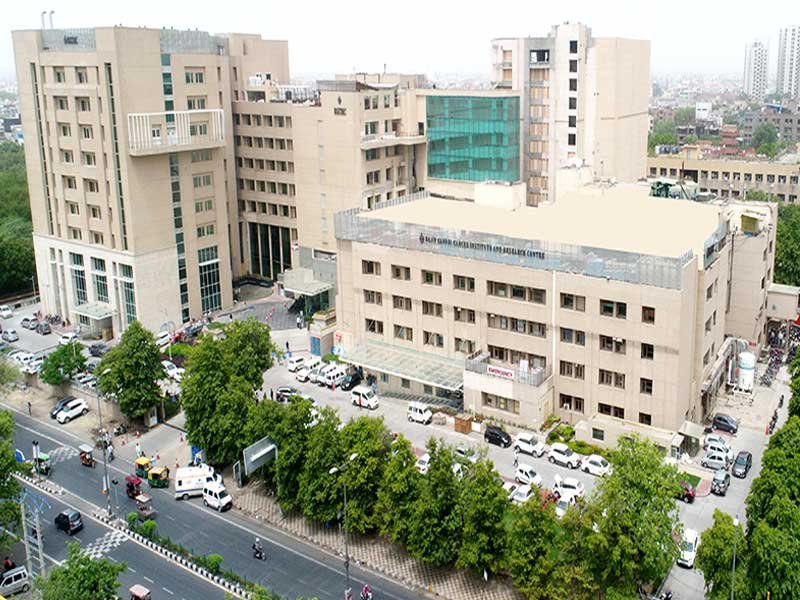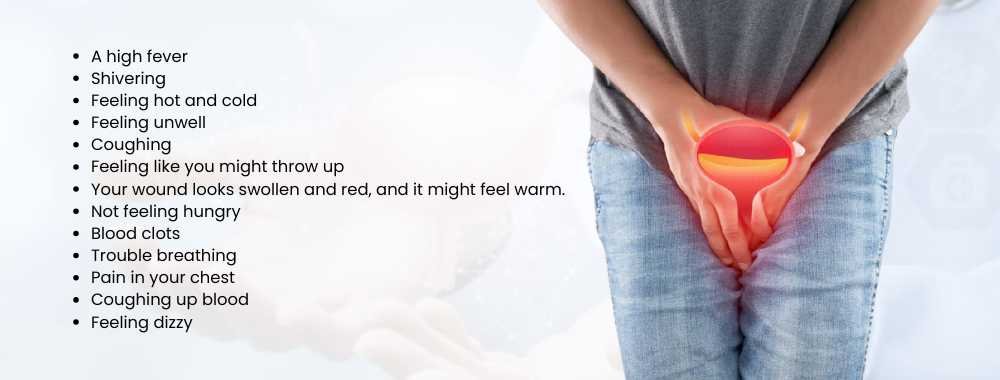Get affordable bladder cancer surgery in India by experienced oncologists using advanced techniques. Receive world-class treatment and care at an affordable cost without compromising on quality care.
Recovery Time
6 Weeks
Success Rate
98%
Hospital Stay
5 Days
Treatment Type
Surgical
Home Treatments Oncology Bladder Cancer Surgery
Are you looking for an affordable option for bladder cancer surgery?
The cost of bladder cancer surgery in India is 4500-9000 USD, which is affordable as compared to Western countries and makes it a preferred choice for international patients.
Bladder cancer is a serious health issue around the world. Each year, thousands of new cases are diagnosed.
In this article, we will examine the cost of bladder cancer surgery and the different factors that affect these costs. Additionally, more people are seeking medical treatment in India because many hospitals and clinics now focus on certain types of care and offer lower prices to attract international patients.
The cost of cancer treatment in India is affordable as compared to other Western countries, yet the cost includes hospital charges, surgeon fees, etc. Here is an overview of information about the cost breakdown:
Cost Component | Details | Cost in INR |
Pre-operative Consultation & Diagnosis | Consultations, X-rays, MRI scans, blood tests | 800 USD |
Surgery Costs | Includes surgeon fees, type of surgery, and hospital stay | 4500-9000 USD |
Rehabilitation and Follow-up | Physiotherapy sessions, medications, supportive devices, and follow-up visits | Variable by procedure |

Oncologist’s Fees
The cost depends on the experienced oncologists you select because highly skilled and board-certified doctors who are capable of delivering successful treatments may charge higher fees, which affects the overall cost of treatment.
Type of Treatment
Sometimes, treating bladder cancer needs more than one type of treatment. Most bladder cancers are treated with surgery and other treatments. That’s why the cost will be different depending on the treatment you need.
Stage of Cancer
The stage of your cancer and its complexity lead to higher costs of the overall treatment.
Number of Chemotherapy and Radiation
The total cost of treatment also depends on how many sessions of chemotherapy and radiation therapy you need, because some people may need more than a few sessions, which will increase the overall cost.
Surgical Facility
Your treatment for bladder cancer in an accredited hospital and performed by skilled and qualified medical staff, is a crucial factor that increases overall treatment cost.
Pre and Post-Treatment Costs
Before surgery, you might need tests and check-ups, and these tests depend on the stage of your cancer and your health, which affects the costs.
Hospital Stay
If you need to stay in the hospital longer, receive ICU care, or require medicines and care after leaving the hospital, it can affect the total cost.
Country | Cost Structure |
India | 4500-9000 USD |
United States | 49400 USD |
Germany | 18600 USD |
Turkey | 8300 USD |
Key Takeaways
Affordable Treatment Cost
India delivers an affordable treatment option for international patients who are looking for an affordable solution for bladder cancer surgery.
Advanced Technology
Indian hospitals have some of the latest advancements to treat patients with bladder cancer, which are more effective and provide precise treatment for faster recovery.
Fill in your details and we'll get back to you soonGet Free Treatment Quote
In India, bladder cancer treatment is effective and meets international standards. Indian hospitals use advanced methods like robotic surgery and the latest technology, and follow international rules to give the best results.
One of the biggest advantages is the cost. Treatment in India is much more affordable than in Western countries, but the quality remains high because Indian healthcare is known for its excellent care and focus on the patient.
Many people come to India for bladder cancer treatment because it costs less than in developed countries. Moreover, India offers thorough health checkups before surgery, less painful options like robotic surgery, and support after surgery to help with recovery.
In Indian hospitals, patients receive personalized care, attention. Many of these hospitals are certified by trusted global organizations like JCI and NABH, which means they meet very high standards.
Bladder Cancer Surgery cost
Treatment Name
Estimated Cost
Bladder Cancer Treatment 4500-9000 USD
The bladder is a small, triangle-shaped organ that is located between your hip bones and stores urine. The inside of the bladder is covered with a special lining called the urothelium. This lining is made of cells that can stretch when the bladder fills with urine and shrink when it is empty.
Bladder cancer forms when some of the cells change and become abnormal, and these abnormal cells grow very fast and don't stop which forming a tumor.

Transitional Cell Carcinoma (Urothelial)
This is the most common type of bladder cancer, and it starts in the cells that line the inside of your bladder. These cancer cells can spread deeper into the bladder wall and even outside the bladder into surrounding tissue.
Squamous Cell Carcinoma
This type of cancer starts in flat cells inside your bladder. Generally, it happens in people who have had long-term bladder problems like infections, irritation, etc.
Adenocarcinoma
Adenocarcinoma is a very rare type of bladder cancer seen in about 1 to 2% of cases, and it forms in gland-like cells in your bladder lining.
Small Cell Carcinoma
This type of cancer is extremely rare, and it happens in nerve-like cells in your bladder.
Sarcoma
Sarcoma is a rare and aggressive type of cancer that starts in the muscle and structural tissues of your bladder and begins in the bladder lining.
Noninvasive
This type of cancer is only in the outer layer or a small area of your bladder's lining, and it has not spread deeper.
Non-Muscle-Invasive
Non-muscle invasive cancer has spread deeper into your bladder wall but has not reached the muscle layer.
Muscle-Invasive
Muscle-invasive cancer has grown into the muscle layer of your bladder, and it may have even spread to the fat and nearby organs.
Bladder cancer is the fourth most common type of cancer. Men are four times more likely to develop it than women. However, when women have bladder cancer, it is often diagnosed later at and more serious stage. This happens because many women do not know the signs of bladder cancer.
Did you know? Bladder cancer is the ninth most common cause of cancer-related deaths worldwide. It affects over 400,000 people each year and is more common in men than in women.
The symptoms of bladder cancer are:
Here are some things that can raise your risk of getting bladder cancer:
Smoking: People who smoke are more than twice as likely to develop bladder cancer.
Radiation treatment: If someone has had radiation therapy to treat another type of cancer, it can raise their chance of getting bladder cancer.
Chemical exposure: People who work with certain chemicals like dyes, rubber, leather, paint, and hairdressing products may have a higher risk.
Bladder infections: If someone has bladder infections, like bladder stones and urinary tract infections may have a higher risk.
Long-term use of a catheter: People who need to use a catheter in their bladder for a long time may also be at higher risk of cancer.
Fill in your details and we'll get back to you soonGet Free Treatment Quote
Bladder cancer often does not show clear signs until it gets worse. Here are some early warning signs:
Blood in Your Urine (Hematuria)
This is one of the most common early signs of bladder cancer: you might see blood in your pee, and it can look pink, red, and sometimes dark brown.
Changes in How You Pee
Bladder cancer can cause changes in your urination, like needing to pee more, especially at night, feeling a strong need to pee even if your bladder is not completely full, pain when you pee, and burning as well.
Pain in Your Pelvic Area
Some people feel pain and discomfort in the lower part of their belly, and it might be mild and can worsen over time.
Feeling Very Tired
When bladder cancer gets worse, it can make you feel tired all the time, and you might also lose weight without trying.
Swelling in Your Legs
If bladder cancer spreads, it can block parts of your body and cause swelling in your legs.
If bladder cancer is not treated, it can spread to other parts of your body. Finding bladder cancer early and starting treatment quickly can help you live longer. About 96 out of 100 people treated in the early stage of bladder cancer are still alive five years later. Overall, about 77 out of 100 people with bladder cancer are still alive five years after they find it.
Bladder cancer spread can depend on the type of bladder cancer you have. The most common type is urothelial bladder cancer. Usually, this type grows and spreads slowly. But like adenocarcinoma, squamous cell carcinoma, and small cell carcinoma can spread more quickly.
Surgery is not always the best treatment for everyone with bladder cancer because it depends on the person's age, overall health, the stage of the cancer, where the cancer is, and other factors.
Generally, bladder cancer symptoms are the same for both women and men, and the most common sign is blood in the urine.
In women, this can sometimes be mistaken for menstrual blood, so it might be ignored. However, men are more likely to notice blood in their urine, so bladder cancer is often diagnosed earlier in men.
Yes, bladder cancer can affect how your kidneys work. In some cases, it can lead to serious problems like chronic kidney disease (CKD) and even kidney failure. Mostly, it happens after a major surgery called a radical cystectomy, in which the bladder is removed.
Doctors in India are highly skilled and internationally trained in treating bladder cancer, and these doctors are dedicated to delivering quality care for patients seeking medical treatment.
Indian hospitals are facilitated with the latest technology and accredited by international organizations such as JCI AND NABH to ensure they meet international medical standards.
Beds: 539
New Delhi
Beds: 230
New Delhi
Beds: 710
New Delhi
Beds: 650
New Delhi
Beds: 191
New Delhi
Beds: 310
New Delhi
Beds: 299
Gurugram
Beds: 380
New Delhi
Beds: 402
New Delhi
Beds: 1300+
Gurugram
Beds: 1000
New Delhi
Beds: 500
New Delhi
Beds: 450
Faridabad
Beds: 675
New Delhi
Beds: 500
New Delhi

Max Super Speciality Hospital, Saket

Aakash Healthcare Super Speciality Hospital

Indraprastha Apollo Hospital

BLK Max Super Speciality Hospital

Dharamshila Narayana Superspeciality Hospital

Fortis Escorts Heart Institute

Fortis Memorial Research Institute

Manipal Hospital Dwarka

Max Super Speciality Hospital Shalimar Bagh

Medanta - The Medicity Hospital

Moolchand Kharaiti Ram Hospital

Rajiv Gandhi Cancer Institute and Research Centre

Sarvodaya Hospital

Sir Ganga Ram Hospital

Venkateshwar Hospital
Doctors suggest several tests to find out if someone has bladder cancer:
Urinalysis
Urinalysis is a test to check your urine, and it helps find signs of infection and other problems.
Urine Cytology
In urine cytology, doctors look at your urine under a microscope to see if there are any cancer cells.
Cystoscopy
This is the main test to find bladder cancer. The doctor uses a thin, tube-like device with a light to look inside your bladder and urethra.
Transurethral Resection of Bladder Tumor (TURBT)
In this procedure, doctors remove tumors from your bladder through the urethra. It is performed to confirm cancer and sometimes even treat it.
MRI Scan
This test uses magnets and radio waves to take clear pictures of your bladder.
CT Scan
A CT scan helps doctors see if the cancer has spread outside your bladder.
PET Scan
PET scans are performed on people with a higher risk of cancer spreading and help check if the cancer has moved to other parts of your body.
Dos
Don’ts
Surgery
Surgery is a common way to treat bladder cancer, and the aim is to remove the cancer while saving as much of the bladder as possible. However, the type of surgery depends on how far the cancer has spread, where it is, and the health of the patient. Here are the main types of surgery for bladder cancer:
Transurethral Resection of Bladder Tumor (TURBT)
It is used when the cancer is at an early stage. The doctor removes the tumor using a tool that goes through the urethra, and there are no cuts on the outside of your body.
Partial Cystectomy
In this surgery, only the part of your bladder with cancer is removed. However, this is only used in a few cases where the tumor is small, and the patient does not want full bladder removal.
Radical Cystectomy
Radical cystectomy is a major surgery. In this procedure, doctors remove the entire bladder along with nearby lymph nodes and sometimes other organs. In men, doctors may remove the prostate and seminal vesicles, whereas, in women, doctors may also remove the ovaries, uterus, and part of the vagina.
However, when the bladder is removed, the doctor will create a new way for urine to leave the body, which is known as urinary diversion.
Neobladder Reconstruction
A new bladder can be created from part of your intestines. The person can still urinate through the urethra, and this procedure works best for healthy patients who do not have other health issues.
Ileal Conduit
If a new bladder is not possible, then the doctor makes another path for urine using part of your intestine. Urine collects in a bag outside your body, which empties regularly. These options help you feel more comfortable and live more comfortably after bladder removal.
Chemotherapy
Chemotherapy uses strong medicine to kill cancer. One method is intravesical therapy, in which the doctor puts the medicine directly into the bladder through a tube. This helps kill cancer without harming healthy parts of your body.
Immunotherapy
Immunotherapy helps your body’s immune system fight cancer. There are two common types:
Bacillus Calmette-Guérin (BCG) Therapy
It is a type of vaccine that makes your immune system stronger to fight cancer cells.
PD-1 and PD-L1 inhibitors
These medicines block certain proteins that help cancer hide from your immune system. When these proteins are blocked, your T-cells can find and kill cancer cells more easily.
Radiation Therapy
Radiation therapy uses high-energy rays to kill cancer cells. Doctors may use radiation along with TURBT and chemotherapy. This treatment is chosen based on how fast the tumor is growing and its location.
At first, you will be on a liquid diet. Then, you can start eating solid food when your body is ready. Eating healthy foods with lots of nutrients helps your body heal and feel better.
Additionally, it is also important to drink plenty of water, and you should not do any hard physical activity until your doctor says so. Gentle movements and light walking, if allowed by the doctor, can help the body get stronger.
Some types of bladder cancer can be cured. However, the chance of a cure depends on how far the cancer has spread in your body, and the stage of cancer shows how complex it is.
Yes, you can live without a bladder, but your body will need a new way to collect and get rid of urine. Typically, this is done through a surgery called urinary diversion.
Bladder cancer often comes back, even after treatment. That’s why it is very important to go for regular check-ups. Moreover, making healthy lifestyle changes can also help lower the chance of the cancer coming back.
No, treatment depends on the stage of cancer, types, and other factors, including non-surgical options like chemotherapy, immunotherapy, targeted therapy, and radiation therapy.
 ,
,
Here are some possible complications after bladder cancer surgery as follows:
Hospital Stay and Recovery Time
The length of a hospital stay after bladder cancer surgery is 5 days, and the recovery time is 6 weeks.
The success rate of bladder cancer surgery in India is 98% as well.
A team of Top Urologists, Oncologists
We facilitate connections with highly skilled, board-certified surgeons who possess over 25 years of experience. These professionals give advanced care and the best treatment options for complex conditions like bladder cancer surgery.
JCI/NABH Accredited Hospitals
Mejocare partners with hospitals with advanced facilities, including the latest technologies such as robotics, machine learning, and the latest diagnostic and therapeutic equipment. This ensures complete and personalized care.
Other Benefits
Our services include quick and detailed responses, accurate cost estimates, assistance in obtaining medical visas, and arranging accommodation in India. We also provide priority appointment scheduling with top doctors. Additionally, we facilitate a smooth arrival experience in India with services such as airport pickup, hotel drop-off, hospitalization assistance, and more.
Bladder cancer can be hard to notice at first because its signs can look like other common problems, such as urinary infections. Knowing the early signs can help find it sooner, which means better chances for treatment. If you have these symptoms, then it is important to see a doctor right away because finding the problem early can improve the chances of successful treatment.
Disclaimer
The information provided in this article is for general advice and does not represent an exact cost estimate. For personalized advice, connect with India’s leading doctors through Mejocare. Contact us today for expert advice.
The cost of Bladder Cancer Treatment in India ranges from 4500-9000 USD.
The success rate of Bladder Cancer Treatment in India is around 98%.
After undergoing Bladder Cancer Treatment in India, the typical hospital stay is approximately 2 days.
After bladder cancer treatment in India, expect initial blood in urine for 2-3 days and minor bleeding for up to 2 weeks. Limit activities, avoid heavy lifting for several weeks, and consult your healthcare provider for guidance on post-discharge activity levels. Fatigue is common during the recovery period.
Bladder cancer treatment outcomes in India demonstrate a highly favorable prognosis, boasting an impressive 96% 5-year survival rate.
Potential risks of bladder cancer treatment in India include bleeding, blood clots, infection, bowel complications, scar tissue formation, organ damage, anesthesia-related risks, healing issues, and fluid buildup at surgical sites (seroma).
Physical therapy is essential for recovery. Kegel exercises are particularly beneficial for bladder cancer rehabilitation. Additionally, considering the specific stage of rehabilitation, prehabilitation of the pelvic floor may be recommended to customize the exercise regimen accordingly.
Yes, it is necessary to have a companion.
If you recently had surgery, your doctor might advise waiting while you recover. When given the all-clear, acquire as much exercise as you can because flying and/or sitting still for extended periods of time might lead to issues like blood clots.
Yes, you can do your own research and choose your therapist.
Paracetamol can be used regularly to control mild to moderate pain. Non-steroidal anti-inflammatory drugs (NSAIDs) such as diclofenac or ibuprofen can be used to control moderate pain.
Yes, insurance will cover the cost of Bladder Cancer Treatment in India.
To discover the top doctors or hospitals in India, you can visit our website, mejocare on the doctors' page, you can filter and find the finest doctors, while on the hospital page, you can identify the best hospitals. Additionally, you can reach out to us, and we will gladly offer you all the necessary suggestions and information you need.
The overall duration of Bladder Cancer Treatment varies. Chemotherapy is given in cycles lasting two, three, or four weeks. Before surgery or radiation therapy, three cycles of chemotherapy are typically administered.
No, there is no waiting list for Bladder Cancer Treatment in India.
Before the surgery, you may undergo tests to ensure a comprehensive evaluation. These tests may include urine cytology, which examines a urine sample for potential cancer cells, and image-based assessments such as a retrograde pyelogram or a CT urogram to assess the components of your urinary tract.
During bladder cancer treatment in India, neuraxial anesthesia is commonly preferred for urological procedures.
2-4 weeks.
Yes, especially if taking opioids, which can cause constipation. Avoid constipation-aggravating foods like high-fat, low-fiber processed items, red meat, full-fat dairy, and sugary treats. Opt for a balanced diet to alleviate constipation.
The hospital offers comprehensive aftercare services, including vital signs monitoring, wound care, post-operative complication management, rehabilitation services, and follow-up care.
Our care team can help you.
